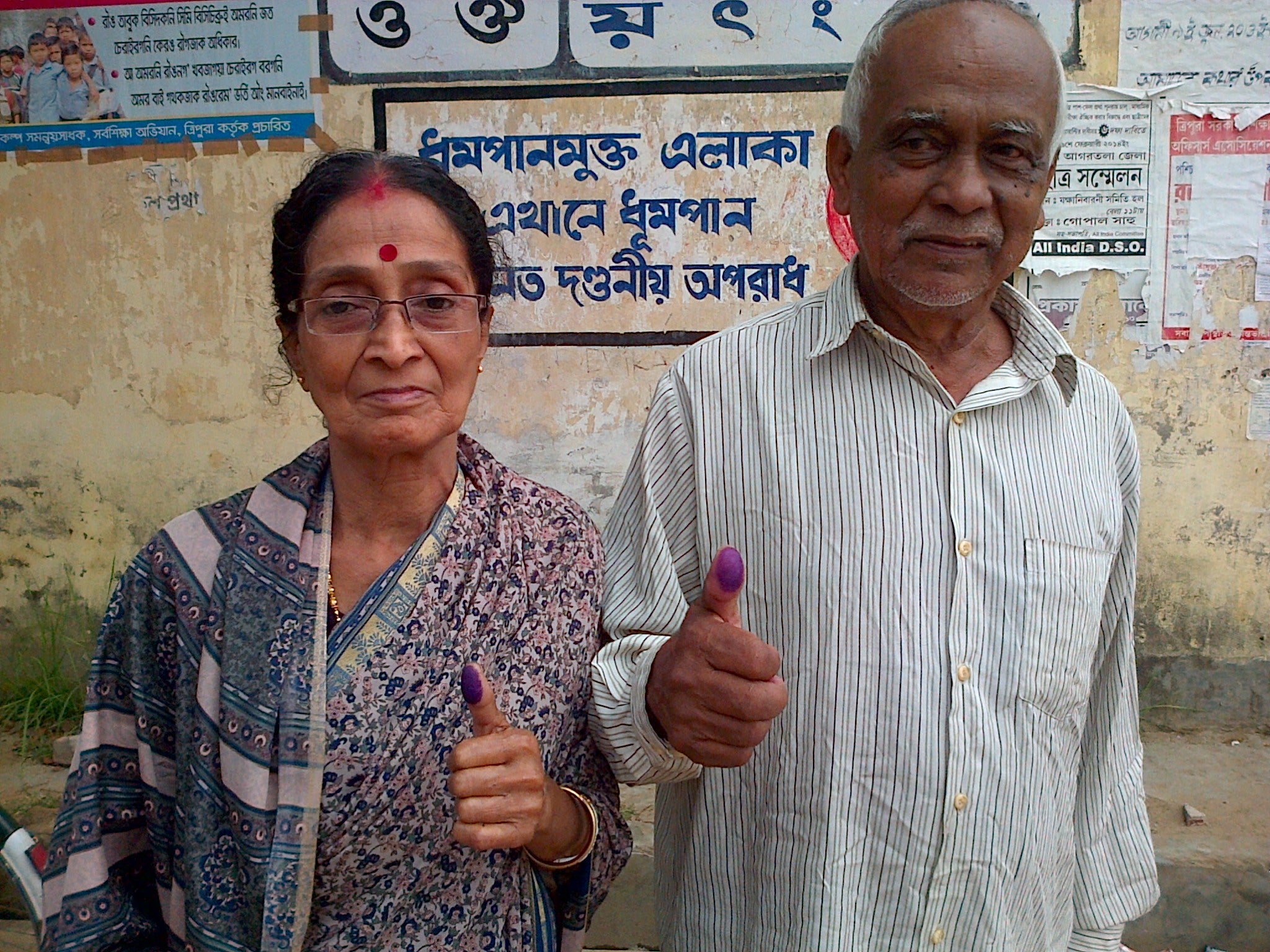Indian election 2014: Campaign turns bitter as India goes to the polls in massive general election
People in parts of the north-eastern states of Assam and Tripura went and cast their ballots in the first of nine days that have been set aside for voting

India today embarked on the start of a massive, month-long series of polls after the leaders of the two main parties heaped further attacks on one another.
People in parts of the north-eastern states of Assam and Tripura went and cast their ballots in the first of nine days that have been set aside for voting by election officials.
Among the very first to vote in the quiet town of Argatala, state capital of Tripura, were Putul Dass, 71, and her husband, 78-year-old Mohanda. At a polling station at the Bijay Kumar secondary school Mrs Dass was first in the women's line while her husband was second to vote among the men.
"The idea was to get here early and to get it done. Then you can spend the rest of the day like a holiday," said Mrs Dass, displaying a purple ink mark on her thumb.
She declined to say which party she had voted for, but said the most important issues for her when casting her vote were dealing with corruption and addressing inflation.
Tripura is one of the final bastions of the Left in India and the state government is controlled by the Communist Party of India (Marxist) (CPI(M)). Mr Dass also declined to say who he had voted for but suggested he had at least some sympathy for the CPI(M). "There is no corruption at the state level - it's in the central government," he said.
In the run-up to voting, India's election campaign has become increasingly bitter, with rival candidates seeking to land verbal blows on one another.
Rahul Gandhi, scion of the Nehru-Gandhi family and face of the ruling Congress party's campaign, accused the main opposition party of "double standards" over corruption and of trying to divide India along communal lines.
Meanwhile, Narendra Modi, the candidate of the main opposition Bharatiya Janata Party (BJP), accused Sonia Gandhi, Mr Gandhi's mother and head of the Congress party, of indulging in vote-bank politics and of misleading India's Muslims.
The rules governing India's elections put in place a so-called "Model Code" to which all parties and politicians are supposed to adhere. It says that while a candidate can criticise the policies of another candidate, they are not get involved in personal attacks.
India's election season got underway with much high-minded talk of sticking to such rules. But, in an echo of elections in many other parts of the world, as polling dates have become nearer, the campaign rhetoric has become increasingly jagged and personal.
A Congress party candidate was arrested after saying he wanted to chop Mr Modi into pieces, while a BJP leader said he wanted to strip Mrs Gandhi and her son and "send them back to Italy." Meanwhile, over the weekend, police filed charges against a senior aide of Mr Modi after he was accused of telling voters in an area that had seen clashes between groups from different religions, that the election was about getting "revenge".
Many polls suggest Mr Modi, who remains scarred by the massacre of hundreds of Muslims in the state of Gujarat in 2002 when he was chief minister, has a wave of support that could see him dislodge the Congress, which has held the last two terms of government.
Mr Modi's polished and professional campaign has projected him as the only person capable of kickstarting India's development and of tackling corruption. On Monday, his party again stressed such issues when, after much delay, it released its manifesto.
"We have chalked out a plan to improve the economic situation in the country in the manifesto," said BJP politician Murli Manohar Joshi. "We need to build a Brand India."
Earlier, at a rally in the state of Haryana, Mr Gandhi had accused the BJP of double standards when it came to corruption.
"[The BJP leaders] go to the state of Karnataka and give big speeches there. They bring BS Yeddyurappa, who was the Karnataka Chief Minister and has been in jail, on to the stage and then say they are against corruption," he said. "Then they go to Chhatisgarh where mining mafia rules and say we are against corruption."
Meanwhile, in a speech in the northern state of Uttar Pradesh, Mr Modi accused Mrs Gandhi and one of her coalition partners of playing vote bank politics.
"They talk of secularism but their politics is all about keeping all classes poor through their politics," he said, according the Press Trust of India news agency. "They can neither provide development nor security to the people and they have no right to be in power even for a second."
Kanchan Gupta, a senior journalist and an adviser to Mr Modi, said he expected the language of the campaign trail would become "saucier" as the month of voting got underway.
"At this point, nobody really has a new point to make and you cannot keep on repeating the old points," he said. "Now is is about addressing the voting classes and the voting classes get very bored with the serious stuff."
At a national level, the campaign has been dominated by the issue of development and tackling corruption. In Tripura, the creation of jobs, especially for young people and those not associated the CPI(M), is an important local issue.
"For the younger generation, the jobs situation is very bad," said Subhankar Karmakar, a 21-year-old student who was walking in a park in Agartala on Sunday evening. "There are jobs, but they are not available to everyone."
Subscribe to Independent Premium to bookmark this article
Want to bookmark your favourite articles and stories to read or reference later? Start your Independent Premium subscription today.

Join our commenting forum
Join thought-provoking conversations, follow other Independent readers and see their replies